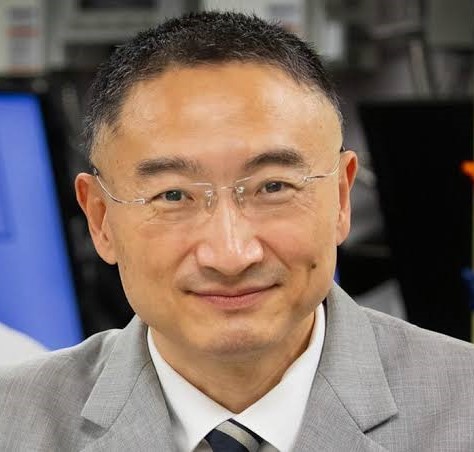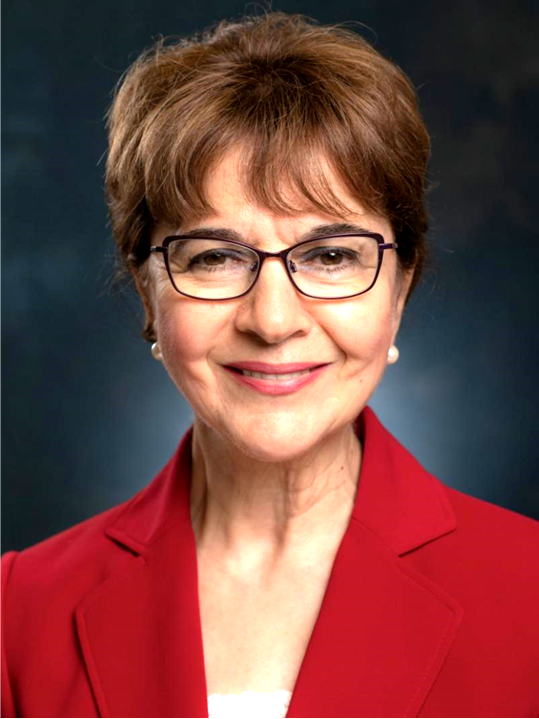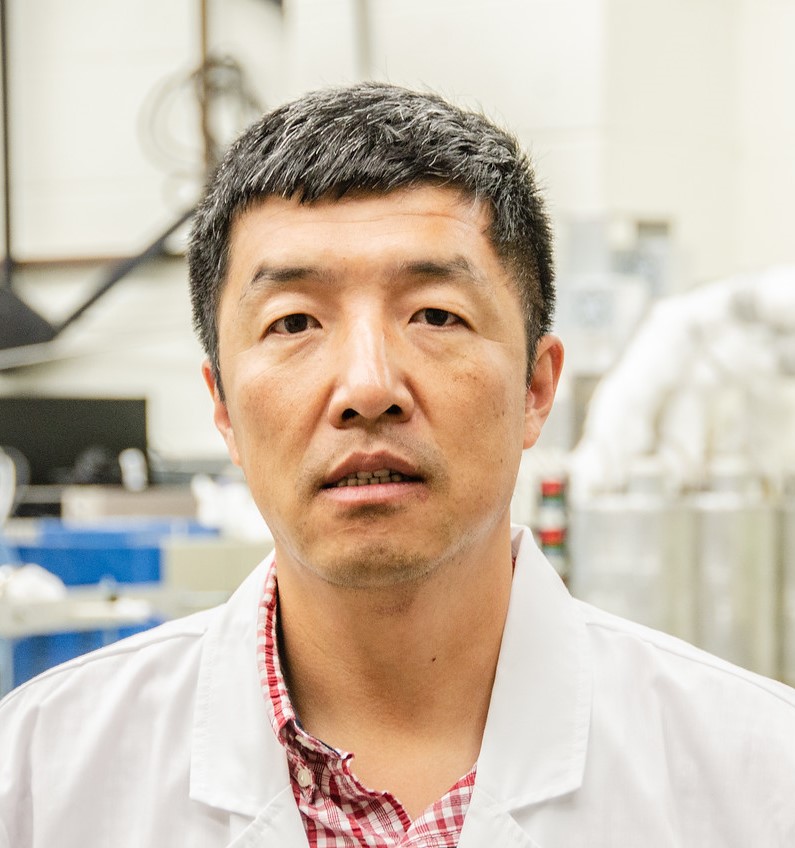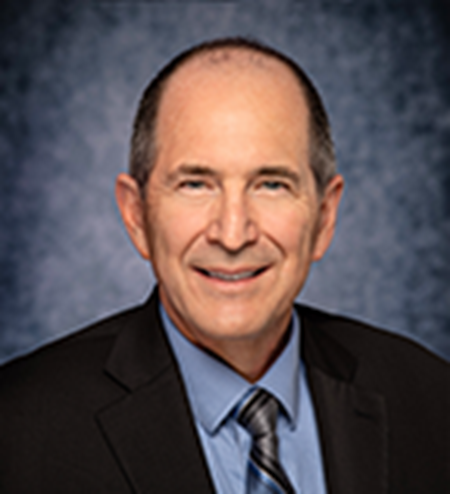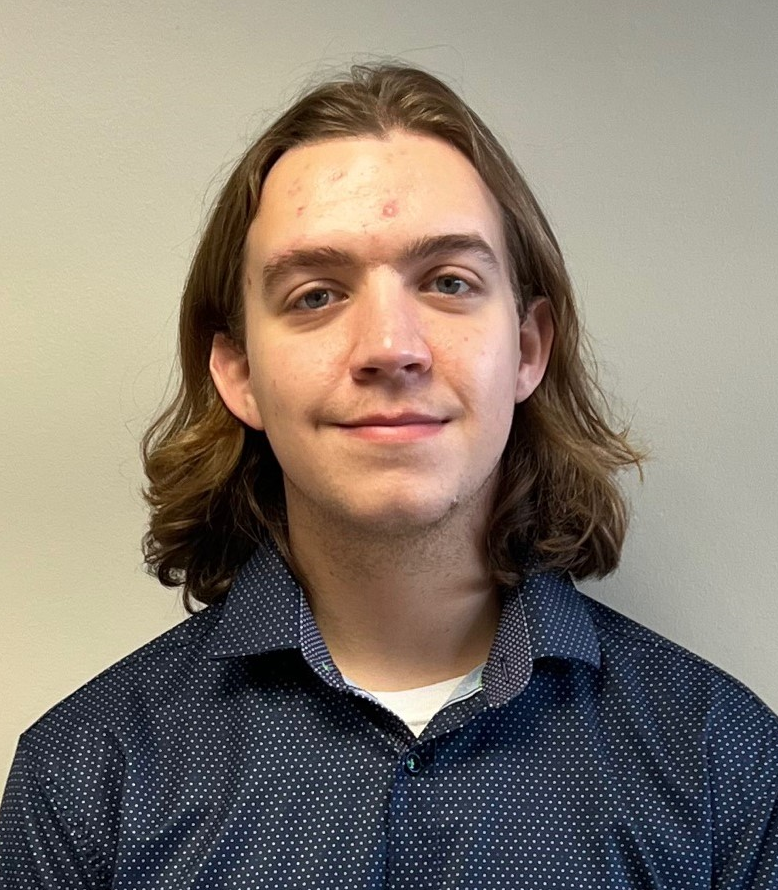Are you ready to power the future?
It’s not a distant dream – it's the rapidly approaching reality of solid oxide technology – used in fuel cells, electrolyzers, sensors and more.
Solid Oxide has emerged as a serious candidate to meet the growing demand for cleaner, more resilient energy systems because they offer high electrical efficiency, long-term stability, fuel flexibility, minimal-to-zero emissions and, relatively low cost.
Discover how SOFCs are revolutionizing power generation, from large-scale industrial applications, residential power generation, transportation (SOFC-EV’s), energy storage, remote areas and microgrids.
Don't just witness the future – be a part of shaping it! Join us at our 6th annual Solid Oxide event that will unlock the immense potential of groundbreaking advancements. Don't miss out on insights, discussions, and networking opportunities that could spark the next big breakthrough! In addition to our featured speakers, we will also have lightning round talks with others.
RSVP today and be part of the energy revolution!
OFCHC Member - $49.00 ---- Guests $99.00
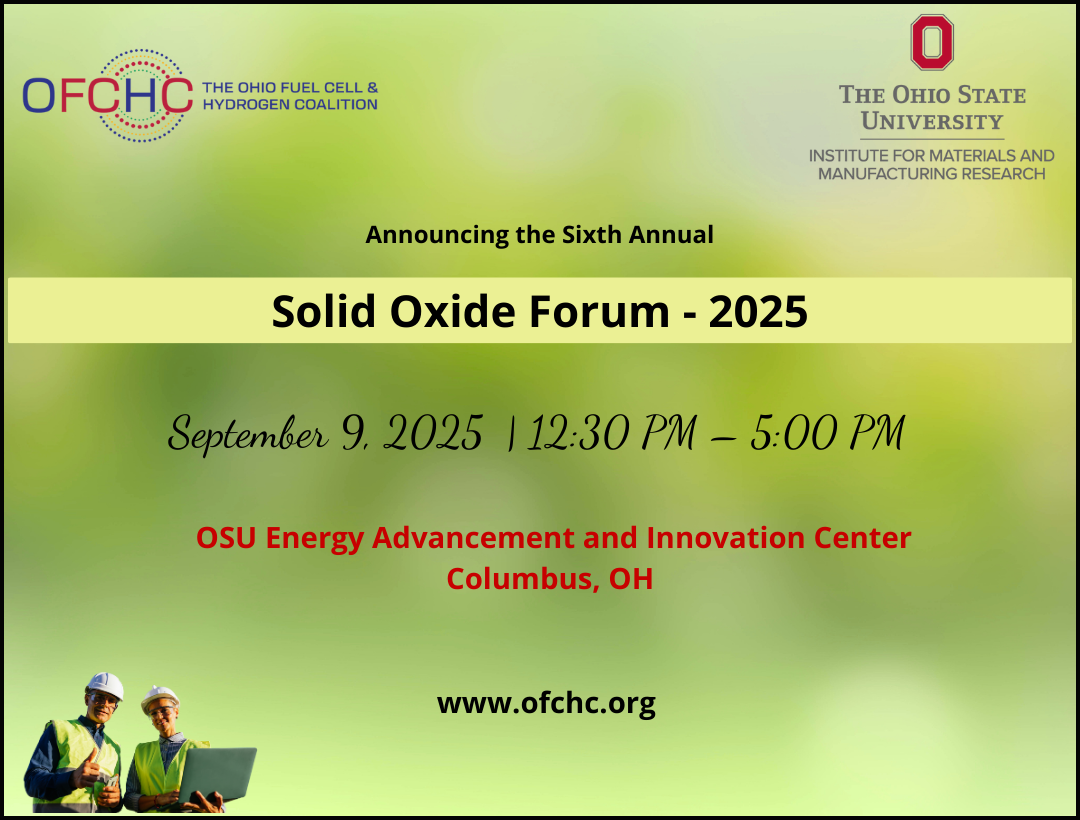
Solid Oxide Forum – September 9, 2025
OSU Energy Advancement and Innovation Center, Columbus, OH
12:30 PM - 5:00 PM EDT
Interested in speaking?
Contact us here
Confirmed Presenters
Xiao-Dong Zhou, Ph.D.
University of Connecticut
Professor, Director, Center for Clean Energy Engineering (C2E2)
The Nicholas E. Madonna Chair in Sustainability
Connecticut Green Bank Professor of Green Hydrogen and Fuel Cells
Presentation Title: Energy Security, Efficiency, and Sustainability: An Emerging Paradigm and Roles of Solid Oxide Cells
(abstract here)
Professor Xiao-Dong Zhou is the Connecticut Green Bank Professor of Green Hydrogen and Fuel Cells, The Nicholas E. Madonna Chair in Sustainability, Director of the Center for Clean Energy Engineering, and a Professor in Chemical and Biomolecular Engineering, Mechanical Engineering, and Materials Science and Engineering at University of Connecticut. He is a special advisor to UConn President Radenka Maric in Sustainability. Dr. Zhou received J. B. Wagner Jr. Young Investigator Award in 2007 from the Electrochemistry Society (ECS) - High Temperature Materials (HTM) Division. He is the recipient of 2011 US DOD – DARPA Young Faculty Award. He is a Fellow of the Electrochemical Society. His research interests span theoretical and experimental studies of materials and interfaces for energy systems, including batteries, fuel cells, and electrolyzers.
Dr. Umit Ozkan
The Ohio State University
Distinguished University Professor and Distinguished Professor of Engineering, Chemical and Biomolecular Engineering
Chair, Chemical and Biomolecular Engineering
Presentation Title: High-temperature electrocatalytic NH3 production from N2 and H2O in a Solid Oxide Electrolytic Cell
Umit S. Ozkan is a Distinguished University Professor, College of Engineering Distinguished Professor and the Chair of the Chemical and Biomolecular Engineering Department at The Ohio State University. She has been on the faculty of Chemical Engineering since 1985. Between 2000 and 2005, she also served as the Associate Dean for Research in the College of Engineering. She received her B.S. (1978) and M.S. (1980) degrees from the Middle East Technical University in Turkey and her Ph.D. (1984) from Iowa State University.
Dr. Ozkan’s current research interests are focused on heterogeneous catalysis and electro-catalysis. She has edited eight books, has written over 250 referred publications and book chapters, given over 350 conference presentations and over 150 invited lectures in 20 different countries. She has eight patents and over 14,000 citations. Professor Ozkan has held and continues to hold many leadership positions in several professional organizations, including American Institute of Chemical Engineers, American Chemical Society and the North American Catalysis Society. She is on the Editorial Boards of Catalysis Today, Journal of Molecular Catalysis, Catalysis Letters, and many others.
Dr. Ozkan is a member of the National Academy of Engineering and a fellow of the American Association for the Advancement of Science (AAS), American Institute of Chemical Engineers (AICHE), and American Chemical Society (ACS). She is a Professional Engineer registered in Ohio.
Xingbo Liu, Ph.D.
West Virginia University
Associate Dean for Research, Statler Chair of Engineering - Benjamin M. Statler College of Engineering and Mineral Resources
Professor - Department of Mechanical, Materials and Aerospace Engineering
Chromium Poisoning of SOC Oxygen Electrode and Its Mitigation Strategies
(abstract here)
Dr. Liu received his Ph.D. on Materials Science from University of Science and Technology Beijing in 1999, and he subsequently came to West Virginia University as a postdoc. Currently, he is the Associate Dean of Research and Statler Endowed Chair Professor of Engineering in Statler College of Engineering and Mineral Resources at West Virginia University. Dr, Liu’s has developed an international recognized research program on materials for next generation energy conversion and storage, with the focus on high temperature materials such as solid oxide electrochemical cells & high temperature Ni-Superalloys. Dr. Liu has received numerous awards, including one R&D 100 Award (2011) for his development of SOFC interconnect coating, TMS Early Career Faculty Fellow Award (2010), TMS Brimacombe Medal (2016), State of West Virginia Innovator of the Year (2013), WVU CEMR Researcher of the Year (2015, 2011), Outstanding Researcher Awards (2015, 2011, 2009, 2008), and several others. He is the Fellow of ASM International and American Ceramics Society. In 2023, Dr. Liu received the Hydrogen Production Technology Award from U.S. Department of Energy in recognition of outstanding contributions to developing high-performing, efficient, and durable intermediate-temperature proton conducting solid oxide electrolysis cells.
Dr. James Seaba
Advanced Research Projects Agency-Energy (ARPA-E)
Program Director
Presentation: REEACH program summary
Click here for summary of program
Dr. Seaba's focus at ARPA-E is on clean, sustainable fuels and chemical production, novel energy system designs, energy distribution, and energy storage.
Dr. Seaba has spent over 30 years developing economically driven energy systems that minimize environmental impacts. He has spent his career in academia, the aerospace and automotive industries, as well as the oil & gas sectors. He has focused much of his career in the oil and gas sector, where he developed technologies for both upstream and downstream business units. Currently, Dr. Seaba is the Program Director for REEACH, ASCEND, and GREENWELLS programs in ARPA-E.
Dr. Seaba founded and led a US-based research center in Ohio known as the Honda Research Institute (HRI). HRI developed cutting-edge technology in microreactors, advanced hydrogen storage, and PEM fuel cell system development. At ConocoPhillips, Dr. Seaba developed fuel cell technologies, supported refining processes, hydrogen production, and novel processes for in-situ oil sands extraction. Dr. Seaba leveraged internal research programs with US National laboratories and Universities. He has developed both renewable and nonrenewable technologies that minimize the environmental footprint for a variety of energy processes over the last 30 years. These processes cover a broad industry spectrum that includes the development of novel hydrogen production technology for fuel cells to the reduction of greenhouse gases in oil sands production. Dr. Seaba has successfully developed and executed technology strategies across multiple industries. Consistently recognized for creative problem solving, leading successful cross-functional teams, and establishing/executing value-added technology development programs. He has successfully commercialized technology from idea to practice. Dr. Seaba has 14 US patents and over 30 refereed journal publications.
Alex Vaeth
Nexceris
Solid Oxide Business Unit
Engineer III
Powering Forward: The Latest in Solid Oxide Stack Technology at Nexceris
Alex Vaeth is currently employed at Nexceris as an Engineer III in the Solid Oxide Business Unit. Before this, Alex worked at Innoveering, LLC as an Associate Analyst Engineer, focusing on planning and processing experimental testing and data analysis. Alex also has experience as a Graduate Research Associate at The Ohio State University, where Alex completed their Master's Degree in Materials Science & Engineering. Alex's diverse background includes internships at the Institute of Aviation and various roles at The Ohio State University, showcasing their expertise in ultra-high temperature materials and functional ceramics.
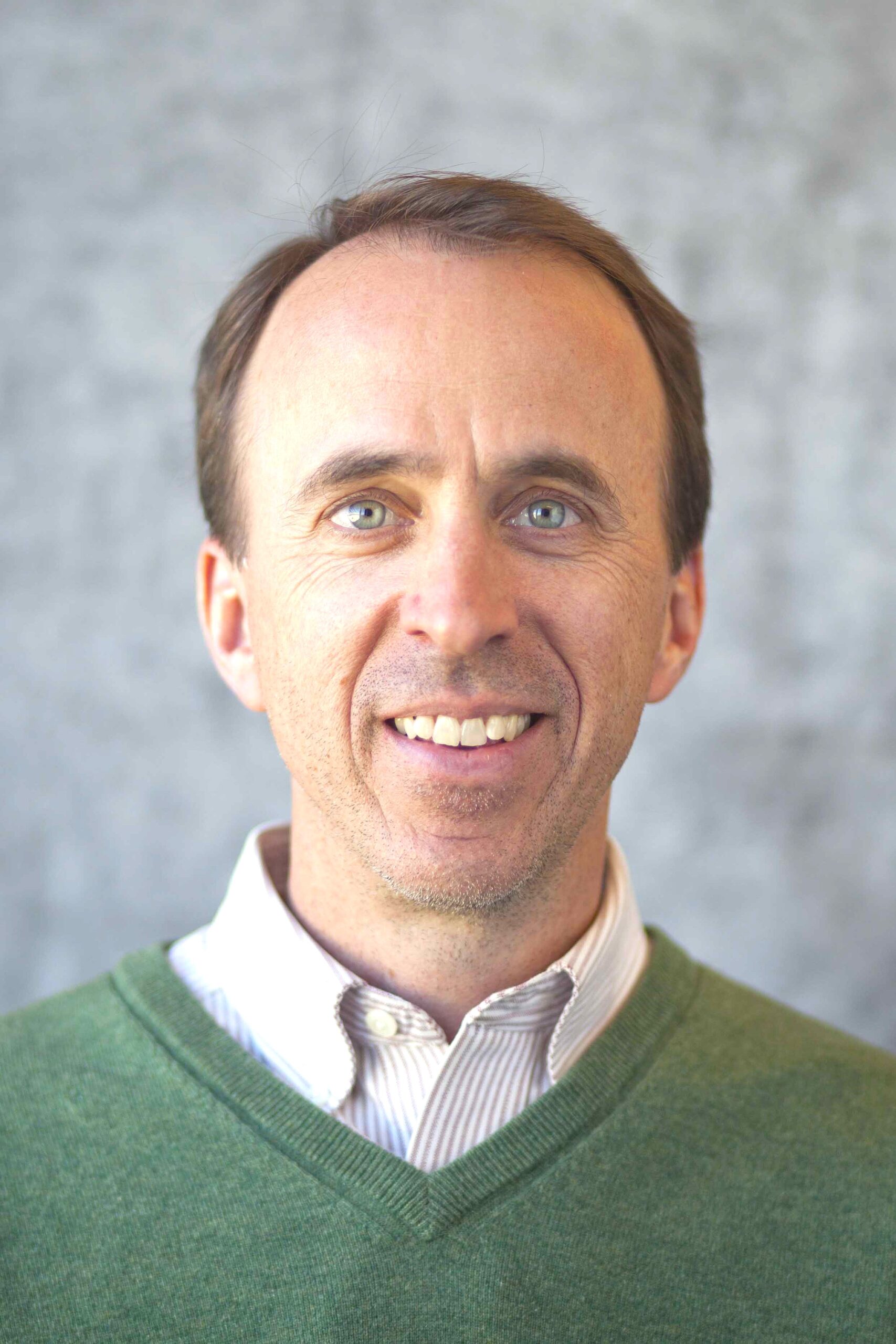
Prof. Neal Sullivan
Colorado School of Mines
Director, Colorado Fuel Cell Center
Professor, Mechanical Engineering
Solid-oxide electrochemistry at elevated pressure
(abstract here)
Professor Sullivan’s research focuses on experimentation with electrochemical ceramics. In his current position as Professor of Mechanical Engineering at Colorado School of Mines, Professor Sullivan leads experimental operations within the Colorado Fuel Cell Center, for which he serves as director. Applications range from fuel cells for efficient electricity generation to electrolyzers for energy storage and hydrogen production to membrane reactors for electro-fuels synthesis. Research activities of emerging electroceramics include device fabrication, microstructural characterization, button-cell scale-up to large-area multi-cell stacks, catalyst integration, performance analysis, and degradation mitigation. At larger scales, Prof. Sullivan’s research includes demonstrations of multi-stack and hybrid fuel-cell/engine systems approaching 100-kW power levels. This span from early-stage materials development to complete system integrations is supported through a robust equipment base formed over decades of collaborative research with many of the world’s leaders in high-temperature electrochemistry.
Lightning Round Participants
- James Wasas - Chairman of the Board and CSO Standard H2, Inc. and H2 Final Filter, Inc.
- Amanda Gibson - Senior Engineer and Technical Program Manager - Nexceris
- Prof. Shang Zhai - Assistant Professor, Mechanical and Aerospace Engineering, Earth Sciences, Chemical and Biomolecular Engineering, The Ohio State University
- Aaron Goodman, Ph.D. - Co-founder and CEO, Petra Power
- Ted Ohrn - Co-founder and CTO, Special Power Sources
- Yanhai Du, Ph.D.- Professor at College of Aeronautics & Engineering, Team Leader and Principal Investigator (PI) of Kent State University's Fuel Cell Research program
Questions?
Bill Whittenberger – bill@ofchc.org
Linda Buckosh – linda@ofchc.org

